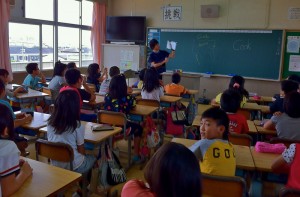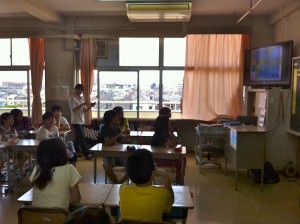Workshop for Elementary School Teachers
 Today was another fun day at school. After a full day of teaching at Tanigawa Junior High School, I took a bike ride over to Sanga Elementary school, where I was scheduled to teach a workshop on elementary English lesson planning and teaching.
Today was another fun day at school. After a full day of teaching at Tanigawa Junior High School, I took a bike ride over to Sanga Elementary school, where I was scheduled to teach a workshop on elementary English lesson planning and teaching.
Last year in Japan, 35 English classes (or “foreign language classes” as they’re officially known) per year became mandatory for 5th and 6th grade elementary school children. This has caused many schools considerable logistical difficulties considering that many teachers in Japan do not receive the basic support or training they need to effectively teach the English language.
As part of an effort to ease the pressure this has put on my city, I have been leading regular workshops about English teaching for the past year. These workshops generally focus on teaching methodology, classroom management, and choosing appropriate topics. These are topics I often speak about at Osaka JET Skills Development Conferences, and I absolutely love doing them for Japanese teachers in my city. It’s such a fulfilling experience to see a teacher communicate information to a student, watch a student understand and reproduce that information, and know that you played some part in that process.
 Today’s workshop was 6 new teachers, me, and an Apple TV. We all took turns comparing notes and experiences from our recent classes. For many of the new teachers who come to these classes, it is their first time teaching English on their own. They have no training in EFL, or the basic ability to speak english themselves, so the classes are really challenging for them.
Today’s workshop was 6 new teachers, me, and an Apple TV. We all took turns comparing notes and experiences from our recent classes. For many of the new teachers who come to these classes, it is their first time teaching English on their own. They have no training in EFL, or the basic ability to speak english themselves, so the classes are really challenging for them.
What I am always surprised about, is how thoughtfully the teachers consider the advice I give them, and apply it to their classrooms. This time around, my advice to them had been to keep up a high speed pace, but remain vigilant and mindful of the students and whether or not they understand what’s going on. I told them to watch their students’ faces, because their faces show whether they understand or not.
I also reminded them that doing too much “repeat after me” is not productive and hinders the students from critically thinking and truly communicating. Unfortunately, this is the standard practice for English class in Japan, and it’s difficult to get teachers here to do something a different way than the only way they’ve ever seen it done in their entire lives.
With the chance to meet as a group, regularly, I’ve seen some amazing improvements. I’m genuinely surprised at some of their thoughts and ideas. Really, it’s just a matter of equipping new teachers with direction and advice regarding implementation. I feel that the best way that I can help them is just to let them know what has worked for me and what has failed for me. I also feel fortunate that we have been able to work in this collaborative fashion. I always feel there is a desire to improve the quality of our students’ educations, sometimes it’s just a matter of getting the time to do it.


 Follow
Follow
 Connect with me on LinkedIn
Connect with me on LinkedIn Follow me on Twitter
Follow me on Twitter Like me on Facebook
Like me on Facebook Read my RSS Feed
Read my RSS Feed